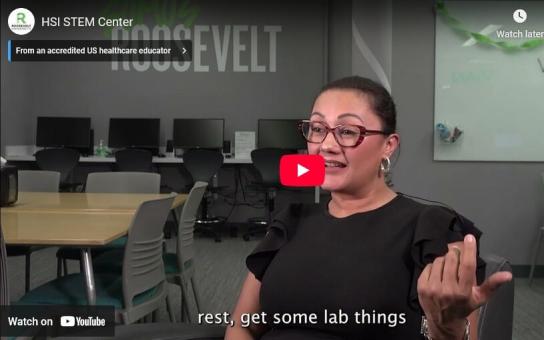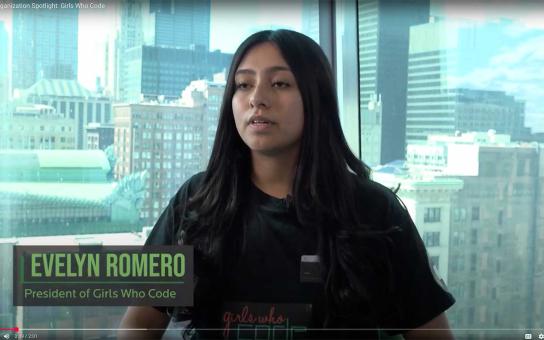
Roosevelt University’s biology program was recently ranked #12 in the nation for women by Washington Monthly, with 87% of its biology graduates identifying as female—well above the national average of 68%. As STEM career opportunities grow, Roosevelt’s College of Science, Health and Pharmacy has stepped up, with women making up 58% of the science faculty in Biological, Physical and Health Sciences. Here are their stories:
Dr. Jasmin Acosta is a Post-Doctoral Teaching and Research Scholar at Roosevelt this academic year. She earned her PhD in integrated biomedical sciences from Rush University in 2024, after graduating with her BS in biology from Roosevelt in 2019. During her undergraduate studies, she conducted research with Dr. Norbert Cordeiro as a McNair Scholar. Dean of the College Dr. Kelly Wentz-Hunter notes, “We are fortunate to have Dr. Acosta return to teach introductory biology and refine her research skills. As a Roosevelt alumna, first-generation college graduate and Latina in science, she helps our students see themselves in this profession and realize they belong.”
According to Assistant Professor of Biology Dr. Jessica Allen, diversity amongst faculty members is pivotal to ensuring equitable access to education. “I think that representation does always matter. It's really hard to imagine yourself someplace if you have never seen anyone with whom you relate.” She continues, “I believe women are often socialized to think and interact differently, which can lead to perceptions that their approach is less scientific. Having female faculty shift the focus from memorization to 'softer skills'—which account for 80% of job success—transforms the stereotype of STEM into something more inclusive.” Dr. Allen’s methodology has proven successful. Of her recent research students, several have gained acceptance to competitive summer internships, post-baccalaureate programs and graduate placements. Dr. Allen was also recently recognized by her students and peers, winning the “Innovative Course Design Award” for her Microbiology Laboratory course at the 2024 Faculty and Staff Awards Presentation.
Professor Natalie Brounsuzian has found similar success by innovating coursework. As an Assistant Teaching Professor of Biology, Professor Brounsuzian teaches within the Nursing program, the Exercise Nutrition and Health Science program, and the Allied Health programs. She includes self-made YouTube videos of lectures as well as engaging classroom activities. Professor Brounsuzian says, “I was really intrigued by the Flipped Classroom model,” which promotes students engaging with information prior to class, allowing class time to focus on activities that promote higher-order thinking. “I realized that videos work well for auditory and visual learners, but kinesthetic learners need something tangible. By using videos for half of the lectures, we can focus on hands-on activities in class.” Professor Brounsuzian, who joined Roosevelt in 2020, credits her passion for teaching to mentorship from women faculty. She values collaboration with female colleagues, stating, “Working with other female scientists fosters creativity and growth. I truly feel a sense of belonging at Roosevelt.”
Dr. Cordelia Chong has served as an Assistant Teaching Professor of Biology since 2019. Her dedication to her students is evident through both her work as an educator as well as an advisor and mentor. According to Dr. Chong, “Over the years, I’ve learned the names of over 500 RU students in my classes and have mentored nearly 40 students on 12 poster presentations for the Annual RU Student Research & Inquiry Symposium.” She continues, “Additionally, I served as the Interim Director of the McNair Scholars Program for one year." The McNair Scholars Program is one of numerous faculty and staff-driven endeavors that provide students with resources to pursue graduate degrees. Dr. Chong recommends that prospective students visit the University to appreciate the unique dynamic of close relationships and interactions between students and faculty, which often surprise those who have transferred from or graduated from larger institutions.
Professor Deema Galambo is a new Assistant Teaching Professor of Biology who is in the final stages of earning her PhD in Biology at Concordia University in Montreal, Canada. She earned a certificate of university teaching in 2021 from Concordia and has extensive teaching experience in Introductory Biology, Genetics, Cell Biology and Human Biology. She is currently teaching the Ecology, Evolution and Genetics courses this fall at Roosevelt. Dr. Galambo is one of the newest additions to the department, a circumstance familiar to her students. She is already forging connections with her students, and shared how one interaction affected her. Of the experience, she says, “it just made me happy that a student felt comfortable enough to talk about her life and asked for some life advice.” Of this recent appointed, Dr. Wentz-Hunter says, “Assistant Teaching Professor Galambo is a great role model for all of our female Muslim students who can see themselves through her accomplishments.”
As an Associate Professor of Biochemistry, Dr. Kelsey Poulson-Ellestad teaches Chemistry, Biology and Marine Biology at Roosevelt. She attributes her success to a supportive family and mentors who guided her through her academic journey. “I’ve been fortunate to have strong women in STEM role models; representation in daily experiences is vital,” she explains. Being a first-generation college student influences her approach to mentorship and teaching. “I consider what prior knowledge my students might have, not just academically but also regarding resources available to them. Do they know there are offices on campus that can help with academic, financial or personal needs?” Dr. Poulson-Ellestad actively directs her students to resources like the HSI STEM Center, the SSS STEM Program and the McNair Scholars Program. In 2025, she will mark her 10th year as a professor at Roosevelt.
Dr. Susan Weiner teaches anatomy and physiology at Roosevelt University, viewing representation as a multifaceted issue. Describing themselves as a “soft-butch Ms. Frizzle,” they reflect on gender expression in their department. “When I arrived, the department was reasonably balanced, but most women presented like me,” she notes. Dr. Weiner observes that many female students present more traditionally feminine than their professors. Today, Dr. Weiner is encouraged by the increased diversity in gender expression among faculty. “We now have a younger group who present in varied ways, which enriches our environment.” Reflecting on her own experiences, she adds, “In college, my female advisors conformed to male-defined traits, as that was the only way to succeed then. I’m glad our department has moved beyond that, fostering a more welcoming atmosphere for young women.” Dr. Weiner believes this shift is essential for creating an inclusive academic environment.
Like the rest of the University, Roosevelt’s biology department is committed to championing equitable access to affordable education for all students, including women who strive to enter STEM-related fields.


